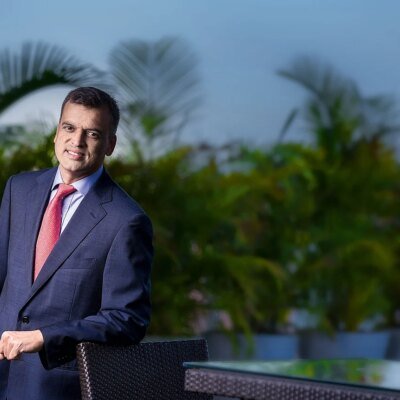To the outside observer, Matt Calderwood was the picture of corporate success. For over 20 years, he delivered results—no matter the circumstances. This mindset initially served him professionally, propelling him to the C-suite, where he oversees 150 employees as managing director of the Americas for multinational software provider SA Global. “I was very good at fragmenting my mind, segmenting the emotions, and putting them in different boxes just to be able to hit the goals at any cost,” he says.
The cost became apparent in 2019, when Calderwood was newly divorced and had no one to open up to about it. He broke down crying when he read about a retreat that helped men find purpose and connection. A few weeks later, he was on an eight-day retreat in Glacier National Park hosted by Evryman, a men’s wellness platform founded in 2016. There, he allowed himself to be vulnerable—crying and sharing with 15 other men as they backpacked through the woods. Each day, the men would hike for four hours, two of which were in silence. They had guided conversations about their relationships, work life, and past. One day was devoted to understanding their anger, followed by cold plunges and meditation.
Calderwood came back from this community feeling as if he were not only a more authentic person but also a better leader—more adept at being present for his team and leading with empathy. “I work in tech, but what gets me out of bed every morning is helping people become the best person that they can be,” says Calderwood, now 43.
Matt Calderwood
Organizations like Evryman are challenging the age-old idea of stoic, self-sufficient masculinity by offering workshops, coaching, and retreats to improve men’s emotional well-being and foster connection. Andrew Horn, founder of Junto, a company that hosts quarterly men’s retreats, says many now see men’s “emotional mastery” as an act of service, not just for the men but for the organizations and communities they occupy. It’s no coincidence, he says, that many of these retreats grew in conjunction with the #MeToo movement of 2017, to which some men responded by reconsidering power dynamics and showing up more intentionally at work.
Men’s retreats have been around for as long there have been, well, men. But providers of the retreats are increasingly appealing to top-performing businesspeople—offering a sort of spiritual version of an executive MBA.
Unmasking men
All leaders—no matter their gender identity—need to take care of their mental health. However, men face particular cultural barriers that prevent them from seeking help.
Showcasing any emotion other than indifference has been wrongly equated with weakness, says Matthew Hodgkin, a therapist at Lightfully Behavioral Health, who adds that men have felt reluctant to pursue traditional therapy.
When people suppress their emotions, they may feel numb or disconnected from others. This can lead to a buildup of anxiety, irritability, and moodiness that even manifests itself physically. And all those consequences can disrupt relationships, including at work—not to mention one’s performance on the job.
Courtesy of Junto
Former NFL player Ryan Mundy says this rings true, especially in the world of pro sports. “We didn’t have the agency or education to talk about our emotions,” he tells Fortune. Understanding the negative impact suppression of feelings can have on performance has steered many business leaders to relinquish a couple of days in the corner office for personal growth outdoors.
Calderwood surprised himself when, during his retreat, he spoke to people he had met mere hours earlier about the death of his younger brother at age 4 when Calderwood was 8.
“For most of my adult life, I blamed myself for my brother’s death,” Calderwood says. “I had lost a great love of my life and my little brother. My heart wasn’t as open to love others.”
Like Calderwood, men often mask their emotions to appear strong. “Now you have multiple men that are crying just because of your story,” he says. “You just see love and care and concern.”
The lone leader
We are in the midst of a loneliness epidemic, and men are feeling it more acutely. Less than a fourth of men, 22%, say they would turn to a friend in a time of need, and a survey from the Priory Group found that 40% of men never talk to anyone about their mental health, primarily owing to embarrassment and stigma.
The physical and mental consequences of loneliness are dire. “You can have the biggest biceps in the world and the biggest bank account in the world, but if you’re emotionally isolated and socially disconnected, you’re not going to be happy,” says Lucas Krump, cofounder of Evryman.
“If you’re emotionally isolated and socially disconnected, you’re not going to be happy.”
Lucas Krump, cofounder of Evryman
Interventions that encourage emotional vulnerability and build connection can help improve men’s well-being, making them, and their workplaces, healthier. A leader’s emotional well-being strongly impacts work life, as one study suggests a boss plays a larger role in an employee’s mental health than their therapist.
“Breath of fresh air”
In a disconnected workplace with high rates of burnout, executives are grappling with how to attain and retain employees. One answer: more human-centered leaders.
Erwin Benedict Valencia, a high-performance coach and former director of training and conditioning for the New York Knicks, has attended many retreats, including Junto. He noticed how taking the time to listen to other men’s stories made him feel more empathetic. “Even amongst the greatest leaders, a retreat like this reminds you that you do have empathy,” he says. “Once you become a founder or a CEO, sometimes empathy goes out the door.”
The retreats help remind Calderwood that his team is composed of complex people, not cogs in a corporate machine. He no longer describes his leadership style as “rough around the edges,” and instead sees emotional awareness as “Leadership 101.” He leads with empathy and emotional authenticity, making space to acknowledge and support workers.
“People are not used to seeing leaders courageously open up, and I think it’s just a breath of fresh air,” says Craig White, founder of Men Without Masks, a retreat based in the U.K. “When I’ve seen it, it gives permission for everybody within the organization to potentially do the same.”
The most popular men’s weekend retreats range from $1,000 to $2,500, and some are specifically tailored to building emotional leadership skills. With their work, Krump and Horn hope that future generations of men can comfortably bring their full selves to the table.
“I’m, like, 70, 80 layers deep that I didn’t even know existed five years ago,” Calderwood says. “There are probably 100 layers to go, and I truly believe it makes me a far better leader.”
This article appears in the April/May 2024 issue of Fortune with the headline, “Goodbye, tough guy.”








